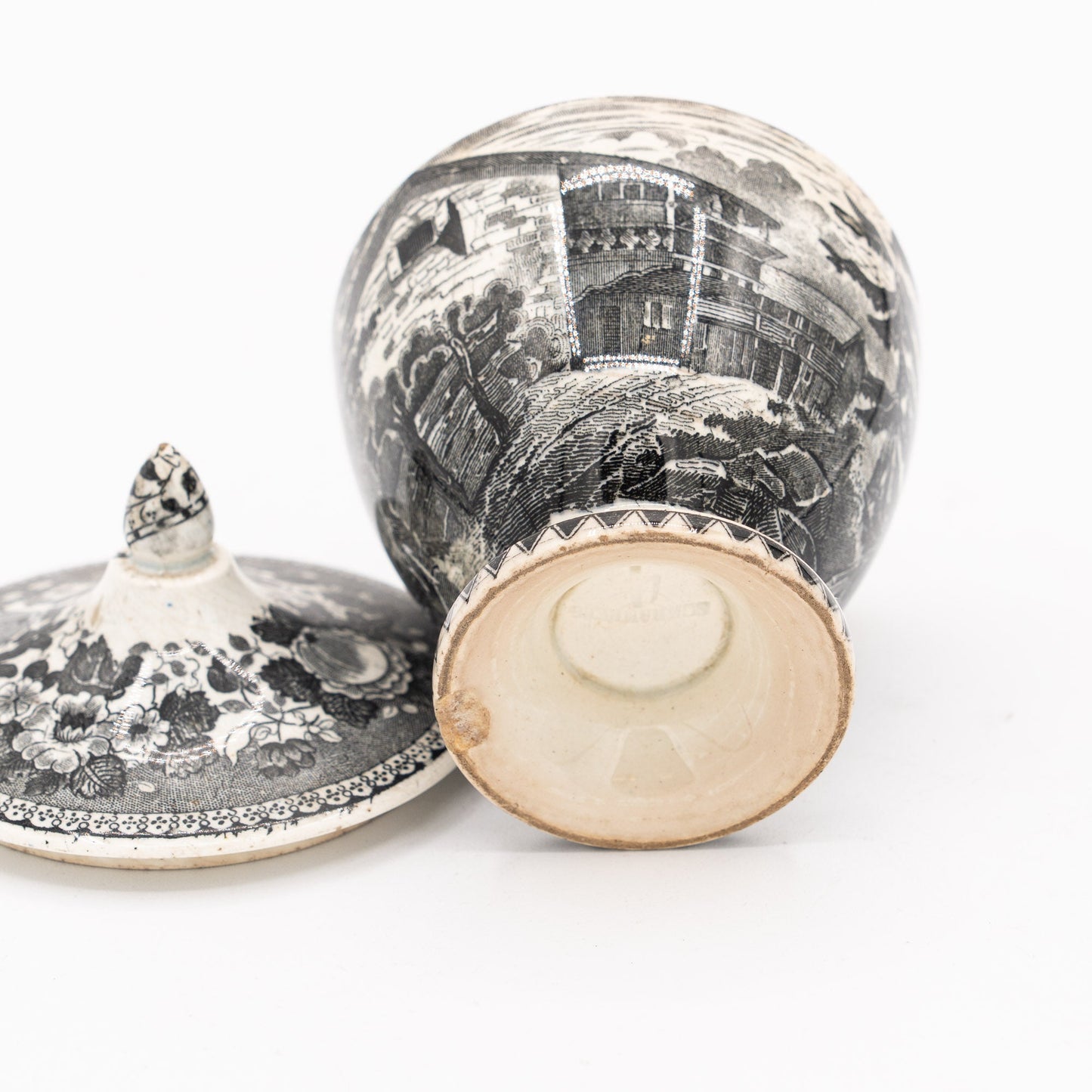Sarreguemines
Black Transferware Lidded Sucrier (Sugar) on Pedestal - Alpine Scene - Sarreguemines - c. mid-19th Century
Black Transferware Lidded Sucrier (Sugar) on Pedestal - Alpine Scene - Sarreguemines - c. mid-19th Century
Couldn't load pickup availability
A tiny theatre in monochrome: on this rare Sarreguemines sucrier, a romantic landscape wraps around the bowl - alpine chalet, tall firs, stormy clouds - framed by a carpet of blossoms on the domed lid.
Rendered in inky black transfer on warm creamware, it’s the kind of early continental piece that bridges rustic story scenes with a refined, neoclassical silhouette.
Perched on its foot and finished with a pointed finial, it’s a beautiful survivor from the mid-1800s and a dramatic accent for a sideboard, teatime, or dressing table.
- Material: Glazed earthenware (faïence), black transfer print with clear glaze; hand-finished details
- Maker: Sarreguemines, Lorraine, France
- Motif: Alpine/romantic landscape with chalet and trees; floral and lace borders; floral carpet to lid; interior vine border
- Style: Early-to-mid 19th-century romantic transferware (black “jet” print; a continental cousin to English flow-decor traditions)
- Place of Origin: Sarreguemines, Moselle, France
- Mark: PBase with impressed factory mark (partially legible in photos); typical of early Sarreguemines impressed wares
- Date of Manufacture: c. 1850–1870 (conservative dating for this body/print/finish)
- Condition: Good antique condition with expected age signs. Even crazing; gentle surface wear to high points and finial; light kiln/grit specks; rim and foot with minor age toning. No structural issues visible in normal handling; please review close-ups.
Share
- Worldwide Shipping
- Secure Packaging
- Loving Curation








Origin & Maker
Sarreguemines is a renowned French faience company that has been producing beautiful ceramics since the late 18th century. Founded in 1790 in the town of Sarreguemines, near the French-German border, the company quickly gained a reputation for creating high-quality earthenware and faience pieces. By the 19th century, Sarreguemines had become one of France’s leading ceramics manufacturers, producing finely decorated tableware, tiles, and decorative items.
Sarreguemines gained international recognition when they showcased their work at the Exposition Universelle in Paris in 1867, a world fair that celebrated industrial and artistic achievements. This exposure helped solidify the company's reputation for innovation and craftsmanship, with their decorative faience pieces becoming highly sought after across Europe.
The company is best known for its intricate Majolica designs, vibrant glazes, and detailed hand-painting. Sarreguemines continued to flourish through the 19th and early 20th centuries, producing everything from rustic faience to elegant Art Nouveau ceramics. Today, pieces from Sarreguemines are cherished by collectors for their rich history and exquisite craftsmanship, embodying the artistry of French faience.
Blog posts
View all-

A Serendipitous Morning at the Rue de Bretagne ...
There are few joys in life that match the thrill of stumbling upon a hidden treasure, and for me, flea markets hold that magical allure. One of my favourite flea...
A Serendipitous Morning at the Rue de Bretagne ...
There are few joys in life that match the thrill of stumbling upon a hidden treasure, and for me, flea markets hold that magical allure. One of my favourite flea...
-

Emile Bourgeois and "Le Grand Dépôt" in Paris
Recently, I found this stunning Sarreguemines wash set. It was at the Brocante in Belfort, France. On this day, we had got up at 4 AM to be there in...
Emile Bourgeois and "Le Grand Dépôt" in Paris
Recently, I found this stunning Sarreguemines wash set. It was at the Brocante in Belfort, France. On this day, we had got up at 4 AM to be there in...
-

The Legacy of Robert Haviland: A Journey from N...
The story of Robert Haviland porcelain is one of artistry, transatlantic ambition, and enduring heritage. It begins in the mid-19th century when David Haviland, an enterprising New Yorker, founded Haviland...
The Legacy of Robert Haviland: A Journey from N...
The story of Robert Haviland porcelain is one of artistry, transatlantic ambition, and enduring heritage. It begins in the mid-19th century when David Haviland, an enterprising New Yorker, founded Haviland...











